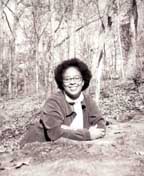Afterthought
I've spent my life lusting for highway, the muscular
mileage flexed full, promise in the linear, the structured
shoulders, the median's forgiveness, the pavement
black as what is left since I was scorched
from the only home I knew, where bottle brush scours
leagues of sky—quail cooing through, Monarch
on the wind, bouquet of salt lick,
of sage, of the vapored breath of eucalyptus,
of the life-ache orchards shed through flower then swollen
then fallen fruit—the sky that blanketed my youth
in the cradle between mountain and sea where, before the road
launched my new attentions, I loved (such a thing) a home.
Language
Silence is one part of speech, the war cry
of wind down a mountain pass, another.
A stranger's voice echoing through a lonely valley,
or a lover's voice, rising so close it is your own
tongue, these are keys to cipher, the way
the hawk's key unlocks the throat
of the sky and the coyote's yip knocks
it shut, the way the aspens' bells measure
the breeze and the rapid's drum conjures
brutality. Sage speaks with one voice, pinyon
with another. Rock, wind her hand and water
her brush, spells her need and scatters
the transcript. Some notes, unheeded, tear
and toss along our paths, but the bulk remains so large
we map our lives around the language of her song.
At Ten
Stripped in a dance of flames, the bluff backing our street
quivered in its wet, black skin, a shawl of haze tugged
tight on rounded starkness. We could have choked
on the fabric of loss. August thick in our throats,
nearly naked as the earth, we teased our feet
with the hot threat of asphalt as we soldiered,
shoeless, through our street-bound play. How could we
prepare for this? Yesterday we had houses, a store.
Sandy built a school. We reeled in wonder
on our cave-strewn hill, oblivious to the beckoning
crescendo and our parents' late communion
with fear. But when our hill swayed into the flaring
undulation, we were pushed from the wilderness
into the strict streets of our suburb where we played,
feet burning, against the fury of fire and of change.

